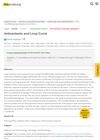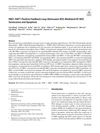 1 citations,
March 2023 in “Science Translational Medicine”
1 citations,
March 2023 in “Science Translational Medicine” Blocking a certain signal in the gp130 receptor can improve tissue healing and lessen osteoarthritis symptoms.
17 citations,
July 2018 in “Environmental and Experimental Botany” Silencing NtNCED3-2 gene in tobacco reduces drought tolerance and impairs growth.
186 citations,
December 2012 in “Current opinion in cell biology” Keratin proteins are increasingly recognized as important for cell health and are linked to many diseases.
32 citations,
June 2021 in “Frontiers in Pharmacology” The hydrogel speeds up burn wound healing and promotes tissue regeneration.
7 citations,
January 2020 in “Journal of King Saud University - Science” Celery helps protect against developmental and brain issues in mice exposed to certain toxins.
 1 citations,
October 2022
1 citations,
October 2022 The conclusion suggests that managing antioxidant levels and the calcium to magnesium ratio may help address Long Covid and related chronic fatigue conditions.
 March 2024 in “Cell communication and signaling”
March 2024 in “Cell communication and signaling” Lack of sleep in mice leads to prostatitis by reducing certain hormones and activating an inflammatory pathway, which can be temporarily fixed with normal sleep.
4 citations,
November 2022 in “Nutrients” Cow placenta extract has strong antioxidant effects and can delay skin aging in mice.
1 citations,
November 2023 in “Biomedicines” Menopause can cause hair thinning and texture changes due to hormonal and metabolic shifts.
Hair proteins in preschool children and their mothers could indicate developmental changes and health status.
 January 2024 in “Current research in toxicology”
January 2024 in “Current research in toxicology” Thallium is highly toxic, causing severe health issues, and Prussian blue is the best antidote.
 June 2023 in “Plastic and Reconstructive Surgery – Global Open”
June 2023 in “Plastic and Reconstructive Surgery – Global Open” Exosomes may improve skin, scars, hair growth, and fat grafts in plastic surgery, but more research is needed.
 October 2023 in “Cell & bioscience”
October 2023 in “Cell & bioscience” A special gene region controls the re-emergence of a primitive wool type in Merino sheep, improving their wool yield and adaptability.
 12 citations,
August 2022 in “Stem cell reviews and reports”
12 citations,
August 2022 in “Stem cell reviews and reports” Increasing PBX1 reduces aging and cell death in hair follicle stem cells by boosting SIRT1 and lowering PARP1 activity.
 2 citations,
September 2022 in “Cellular and molecular biology”
2 citations,
September 2022 in “Cellular and molecular biology” Agaricus bisporus derived β-Glucan could be an effective cervical cancer treatment with antimicrobial and antioxidant properties.
 December 2024 in “Cell Communication and Signaling”
December 2024 in “Cell Communication and Signaling” Fat tissue vesicles protect skin from UV damage better than stem cell vesicles.
 December 2023 in “European Journal of Medicinal Chemistry”
December 2023 in “European Journal of Medicinal Chemistry” Natural products might be safe, effective, and affordable treatments for hair loss.
 3 citations,
December 2020 in “Scientific reports”
3 citations,
December 2020 in “Scientific reports” Mitochondrial problems in tooth cells lead to bad enamel and dentin development in mice.
 6 citations,
December 2016 in “Springer eBooks”
6 citations,
December 2016 in “Springer eBooks” Environmental stressors like UV radiation, pollution, and extreme temperatures can damage skin and lead to diseases and aging.
 4 citations,
February 2022 in “Frontiers in molecular biosciences”
4 citations,
February 2022 in “Frontiers in molecular biosciences” Chronic stress in mice changes skin metabolism and gene expression, leading to hair loss.
 16 citations,
May 1998 in “International Journal of Dermatology”
16 citations,
May 1998 in “International Journal of Dermatology” Stress hormones like cortisol may trigger psoriasis flare-ups.
 11 citations,
March 2018 in “Protoplasma”
11 citations,
March 2018 in “Protoplasma” Lipopolysaccharides boost wheat seedling growth, but procyanidin B2 weakens this effect.
 13 citations,
October 2010 in “Pharmacogenomics”
13 citations,
October 2010 in “Pharmacogenomics” Researchers found that most genes affecting drug responses are not fully covered by commercial SNP chips, suggesting the need for more comprehensive tools to optimize drug selection based on genetics.
 9 citations,
September 2018 in “Journal of Photochemistry and Photobiology B-biology”
9 citations,
September 2018 in “Journal of Photochemistry and Photobiology B-biology” A hair-growth formula with cystine and thiamin helps protect skin cells against UV damage and improves their growth.
 6 citations,
January 2020 in “BMC Neuroscience”
6 citations,
January 2020 in “BMC Neuroscience” Male tissue has more cell death than female tissue after ischemia, and some neurosteroids only protect female cells.
 25 citations,
July 2019 in “Journal of drug delivery science and technology”
25 citations,
July 2019 in “Journal of drug delivery science and technology” Researchers created better skin-application menthol capsules that are stable, safe, and penetrate the skin quickly.
 2 citations,
December 2019 in “Journal of Dermatological Treatment”
2 citations,
December 2019 in “Journal of Dermatological Treatment” Metabolic syndrome reduces effectiveness of hair loss treatment.
 2 citations,
October 2009 in “The FASEB Journal”
2 citations,
October 2009 in “The FASEB Journal” Stress does not greatly speed up aging or hair loss in politicians.
 January 2024 in “Deleted Journal”
January 2024 in “Deleted Journal” Essential oils like lavender, chamomile, and bergamot help manage stress and improve well-being.
 August 2021 in “Benha Journal of Applied Sciences”
August 2021 in “Benha Journal of Applied Sciences” Stress can trigger and worsen vitiligo.























